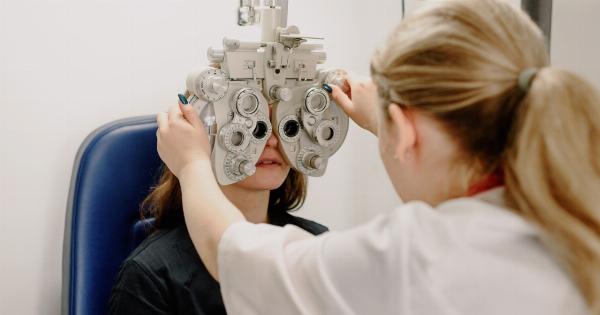Contact lenses are a popular and convenient alternative to eyeglasses for many people. They offer clear vision without the hassle of frames and are often preferred for cosmetic reasons as well.
However, wearing contact lenses may not always be a comfortable experience. From dryness to irritation, contact lens discomfort can be quite frustrating. In this article, we will explore the common causes of contact lens discomfort and provide some effective tips for dealing with it when enough is enough.
The Importance of Proper Cleaning
One of the primary reasons for contact lens discomfort is inadequate cleaning. When contact lenses are not properly cleaned and disinfected, bacteria, debris, and protein deposits can build up on the surface of the lens.
This not only affects the comfort but also increases the risk of eye infections. Therefore, it is essential to follow the prescribed cleaning instructions provided by your eye care professional. Make sure to use the recommended cleaning solutions and avoid using tap water or saliva to clean your lenses.
Choosing the Right Solution
Not all contact lens solutions are created equal. Some individuals may develop allergies or sensitivities to certain solutions, leading to discomfort and irritation.
If you experience persistent discomfort, consider trying a different contact lens solution. You can consult your eye care professional to recommend a solution that suits your eyes best.
Replacing Lenses Regularly
Wearing contact lenses beyond their recommended replacement schedule can contribute to discomfort. Over time, contact lenses may accumulate deposits and lose their shape, making them less comfortable to wear.
Be sure to follow the replacement schedule recommended by your eye care professional. Regularly replacing your lenses will help ensure optimal comfort and vision.
Dryness and Lubrication
Dryness is a common complaint among contact lens wearers. Contact lenses can cause dry eyes due to reduced oxygen flow to the cornea. To address this issue, using lubricating eye drops specifically formulated for contact lens wearers can provide relief.
These drops help replenish moisture and soothe dryness. It is important to use eye drops recommended for contact lens use as not all eye drops are suitable for use with contacts.
Proper Insertion and Removal
Improper insertion and removal techniques can also lead to discomfort. If you are not inserting or removing your contact lenses correctly, you may inadvertently scratch your cornea or irritate your eyes.
Ensure you wash your hands thoroughly before handling your lenses and follow the proper technique as demonstrated by your eye care professional. This will help minimize the risk of discomfort or injury.
Addressing Allergies and Sensitivities
Some individuals may develop allergies or sensitivities to contact lens materials or cleaning solutions. If you suspect that you have an allergy or sensitivity, consult your eye care professional.
They can recommend alternative lens materials or hypoallergenic solutions that are less likely to cause discomfort.
UV Protection
Prolonged exposure to the harmful ultraviolet (UV) rays of the sun can cause discomfort and damage to the eyes, even when wearing contact lenses. UV protection is essential to safeguard your eyes from potential harm.
Look for contact lenses that offer UV protection or consider wearing sunglasses that provide adequate UV protection over your contact lenses.
Avoiding Irritants
Irritants in the environment can exacerbate contact lens discomfort. Smoke, dust, and other airborne particles can accumulate on the surface of your lenses, leading to irritation.
Consider wearing protective eyewear or avoiding environments with high levels of irritants when possible. Additionally, avoid using hairspray or other products near your eyes that could potentially come into contact with your lenses and cause discomfort.
Regular Eye Exams
Regular eye exams are crucial for identifying any underlying issues that may be causing contact lens discomfort. Your eye care professional can closely examine your eyes and ensure that your contact lenses are the right fit for your eyes.
They can also detect any signs of infection or inflammation early on, preventing further discomfort or complications.
Seeking Professional Help
If you have tried the above tips and continue to experience contact lens discomfort, it is important to seek professional help.
Your eye care professional will be able to assess your specific situation and provide tailored advice and solutions to address your discomfort.
Conclusion
Contact lens discomfort can significantly impact your quality of life, but it doesn’t have to be a constant struggle.
By following proper cleaning practices, using the right solutions, replacing lenses regularly, addressing dryness, practicing correct insertion and removal techniques, managing allergies and sensitivities, ensuring UV protection, avoiding irritants, scheduling regular eye exams, and seeking professional help when needed, you can effectively deal with contact lens discomfort. Remember, your eye health and comfort should always be a priority.




























